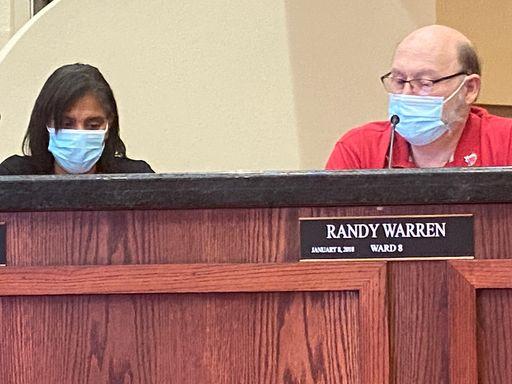From the left, Lawton City Council members Onreka Johnson and Randy Warren listen to a discussion during a meeting Tuesday at Lawton City Hall. The council voted to reorganize Lawton's emergency communications department in a bid to attract and retain dispatchers.
LAWTON — Lawton is overhauling its emergency communications department in an effort to recruit and retain dispatchers.
During a special meeting Tuesday, the Lawton City Council voted 6-0 to reorganize the department, which includes reclassifying current staffers and boosting their pay to bring Lawton in line with other Oklahoma cities. Council members Linda Chapman and Jay Burk were absent.
City officials said in August that the COVID-19 pandemic has made it difficult for the emergency communications department to retain employees. The worker shortage has forced the city to use workers from other departments to help staff the 911 call center.
Dispatchers need specific training before they can begin work as either a dispatcher or a call taker, according to a fact sheet from City Hall. Training someone to staff a console takes at least two to three months, while fully training a dispatcher in all aspects of the job can take up to one year.
City staffers compared the department’s compensation package with the compensation similar-sized cities offer and discovered that Lawton’s is one of the lowest, said Deputy City Manager Dewayne Burk.
“In fact, when we looked at the latest OML (Oklahoma Municipal League) Salary and Benefits Survey, out of the top 15 that had reported numbers on this, I think we were No. 12 out of 15,” he said.
Burk said a recent study showed that the average turnover rate for Oklahoma dispatchers is approximately 21%, which meant that one out of every five employers are leaving 911 call centers.
Under the reorganization plan, which will be implemented Oct. 1, the city will raise dispatchers’ starting salary to a little over $19 an hour. The city will tap its cellular service fee fund to cover the extra cost, while Comanche County will be responsible for 20% of dispatchers’ salaries.
The emergency communications department will also switch to a 2-2-3 schedule with four teams of employees, which is designed to allow more flexible scheduling and improve attendance. A 2-2-3 schedule means employees will work 12-hour shifts for two days in a row, then have two days off before returning to work. They will work 12-hour shifts for another two days, then have three days off.
Other measures include adding a deputy director to provide additional leadership and assist in quality control, and implementing policies and procedures tailored to the department’s needs.
Reorganizing the department will make it a more attractive place to work, Burk said.
“Over the years, we’ve just not really paid enough attention to our 911 center and what they need from an employee standpoint,” he said. “And this is an opportunity for us to go in, make some corrections and improve that work environment out there.”
Councilman Randy Warren said he was glad the city was taking steps to recruit and retain dispatchers, who he described as the “first, first responders.”
“I think this is a really good deal,” he said. “I think it’s been a long time coming.”


